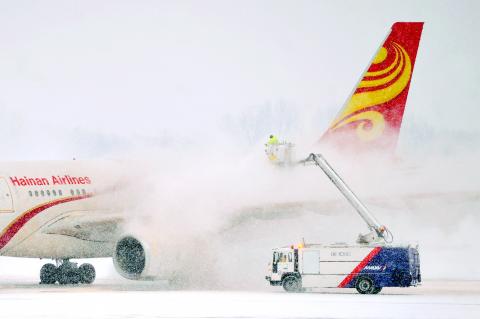Europe is willing to discuss its new carbon emissions tax for airlines with disgruntled governments, but has no plans to scrap the levy, a top EU official said yesterday.
“We’re ready to negotiate within our framework,” Siim Kallas, European Commission vice president and transport commissioner, said at an aviation conference in Singapore. “We aren’t trying to dominate the world.”
The EU imposed the tax, known as the emissions trading scheme, on Jan. 1 in a bid to curb emissions of climate-changing gases, but money will not be collected until next year. Under the system, airlines flying to or from Europe must obtain certificates for carbon dioxide emissions. They will get free credits to cover most flights this year, but must buy or trade for credits to cover the rest.

Photo: EPA
Airlines and governments have complained the tax is too costly and was implemented unilaterally by Europe. Industry leaders are warning the disagreement could spark a trade war between Europe and the rest of the world.
“I’m very worried,” said Tom Enders, CEO of Airbus, the world’s largest commercial airplane maker. “What started out as a solution for the environment has become a source of potential trade conflict.”
Last week, China barred its carriers from paying the charges or other fees without government permission, and Russia, India and the US have also voiced opposition.
Asian carriers say the carbon tax unfairly penalizes them because the charge is based on the distance of the flight.
Malaysian long-haul budget carrier AirAsia X said last month it plans to eliminate flights to Europe, in part because the carbon tax increased costs and made flights less profitable.
“The longer you fly direct, the more you’re penalized,” AirAsia X CEO Azran Osman-Rani said. “There was hope that the EU would back down, but they didn’t. Now they have to deal with China, good luck with that.”
The International Air Transport Association (IATA), which represents 240 airlines, is urging the EU to negotiate new carbon emissions guidelines through the International Civil Aviation Organization.
“Non-European governments see this extraterritorial tax collection as an attack on their sovereignty,” IATA CEO Tony Tyler said yesterday. “Aviation can ill afford to be caught in an escalating political or trade conflict.”
Tyler, who previously was CEO of Cathay Pacific Airways, reiterated IATA’s forecast that airline profits would likely fall to US$3.5 billion this year from US$6.9 billion last year as a slowing global economy and high fuel costs pinch earnings.
Kallas said the inability for governments to forge a global deal on reducing carbon emissions prompted the EU to act.
“The EU asked for years and years that there be a global solution on climate change,” Kallas said. “We’re protecting our citizens.”

Intel Corp chief executive officer Lip-Bu Tan (陳立武) is expected to meet with Taiwanese suppliers next month in conjunction with the opening of the Computex Taipei trade show, supply chain sources said on Monday. The visit, the first for Tan to Taiwan since assuming his new post last month, would be aimed at enhancing Intel’s ties with suppliers in Taiwan as he attempts to help turn around the struggling US chipmaker, the sources said. Tan is to hold a banquet to celebrate Intel’s 40-year presence in Taiwan before Computex opens on May 20 and invite dozens of Taiwanese suppliers to exchange views

Application-specific integrated circuit designer Faraday Technology Corp (智原) yesterday said that although revenue this quarter would decline 30 percent from last quarter, it retained its full-year forecast of revenue growth of 100 percent. The company attributed the quarterly drop to a slowdown in customers’ production of chips using Faraday’s advanced packaging technology. The company is still confident about its revenue growth this year, given its strong “design-win” — or the projects it won to help customers design their chips, Faraday president Steve Wang (王國雍) told an online earnings conference. “The design-win this year is better than we expected. We believe we will win

Chizuko Kimura has become the first female sushi chef in the world to win a Michelin star, fulfilling a promise she made to her dying husband to continue his legacy. The 54-year-old Japanese chef regained the Michelin star her late husband, Shunei Kimura, won three years ago for their Sushi Shunei restaurant in Paris. For Shunei Kimura, the star was a dream come true. However, the joy was short-lived. He died from cancer just three months later in June 2022. He was 65. The following year, the restaurant in the heart of Montmartre lost its star rating. Chizuko Kimura insisted that the new star is still down

While China’s leaders use their economic and political might to fight US President Donald Trump’s trade war “to the end,” its army of social media soldiers are embarking on a more humorous campaign online. Trump’s tariff blitz has seen Washington and Beijing impose eye-watering duties on imports from the other, fanning a standoff between the economic superpowers that has sparked global recession fears and sent markets into a tailspin. Trump says his policy is a response to years of being “ripped off” by other countries and aims to bring manufacturing to the US, forcing companies to employ US workers. However, China’s online warriors